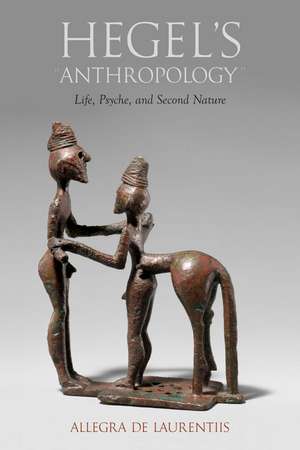Hegel's Anthropology: Life, Psyche, and Second Nature
Autor Allegra de Laurentiisen Limba Engleză Hardback – 14 aug 2021
This book provides a critical analysis of Hegel’s Anthropology, a long-neglected treatise dedicated to the psyche, or “soul,” that bridges Hegel’s philosophy of organic nature with his philosophy of subjective spirit. Allegra de Laurentiis recuperates this overlooked text, guiding readers through its essential arguments and ideas. She shows how Hegel conceives of the “sublation” of natural motion, first into animal sentience and then into the felt presentiment of selfhood, all the way to the threshold of self-reflexive thinking. She discusses the Anthropology in the context of Hegel’s mature system of philosophy (the Encyclopaedia) while also exposing some of the scientific and philosophical sources of his conceptions of unconscious states, psychosomatism, mental pathologies, skill formation, memorization, bodily habituation, and the self-conditioning capacities of our species. This treatise on the becoming of anthropos, she argues, displays the power and limitations of Hegel’s idealistic “philosophy of the real” in connecting such phenomena as erect posture, a discriminating hand, and the forward gaze to the emergence of the human ego, or the structural disintegration of the social world to the derangement of the individual mind.
A groundbreaking contribution to scholarship on Hegel and nineteenth-century philosophy, this book shows that the Anthropology is essential to understanding Hegel’s concept of spirit, not only in its connection with nature but also in its more sophisticated realizations as objective and absolute spirit. Future scholarship on this subject will recount—and build upon—de Laurentiis’s innovative study.
A groundbreaking contribution to scholarship on Hegel and nineteenth-century philosophy, this book shows that the Anthropology is essential to understanding Hegel’s concept of spirit, not only in its connection with nature but also in its more sophisticated realizations as objective and absolute spirit. Future scholarship on this subject will recount—and build upon—de Laurentiis’s innovative study.
Preț: 695.46 lei
Preț vechi: 848.12 lei
-18% Nou
Puncte Express: 1043
Preț estimativ în valută:
133.08€ • 139.94$ • 109.96£
133.08€ • 139.94$ • 109.96£
Carte indisponibilă temporar
Doresc să fiu notificat când acest titlu va fi disponibil:
Se trimite...
Preluare comenzi: 021 569.72.76
Specificații
ISBN-13: 9780810143777
ISBN-10: 0810143771
Pagini: 264
Dimensiuni: 152 x 229 x 30 mm
Greutate: 0.33 kg
Editura: Northwestern University Press
Colecția Northwestern University Press
ISBN-10: 0810143771
Pagini: 264
Dimensiuni: 152 x 229 x 30 mm
Greutate: 0.33 kg
Editura: Northwestern University Press
Colecția Northwestern University Press
Notă biografică
ALLEGRA DE LAURENTIIS is a professor of philosophy at Stony Brook University. She is the author of Subjects in the Ancient and Modern World: On Hegel’s Theory of Subjectivity, the editor of Hegel and Metaphysics: On Logic and Ontology in the System, and the coeditor of The Bloomsbury Companion to Hegel.
Cuprins
Abbreviations
Preface
Introduction: Spirit’s Humble Beginnings
1. On the character of Hegel’s text
2. Text and Context
Chapter 1. Aristotelian Roots
1. On unraveling the sense of psuchē
2. Hylomorphism
3. The real unity of the Cartesian man
4. Return to the roots: being-soul
Chapter 2. Life, or die Weltseele
1. Nature exceeds itself
2. Goethe’s Urphänomen
3. Hegel’s Urteil
4. Natural spirit
Chapter 3. False Enigmas and Real Beginnings
1. Mind-body conundrums and the meaning of Idealism
2. The soul begins as world-soul (kosmos zōon empsuchon)
Chapter 4. Animal Life, or das tierische Subjekt
1. The strange case of the human soul
2. One genealogy, many races
3. From Enlightenment to Reaction: Johann Blumenbach to James Hunt
Chapter 5. No Longer Just Animal Life
1. The soul of peoples
2. Kinship and the individual: disposition, temperament, character
3. Kinship and the individual: age, sexuality and the patterns of life
Chapter 6. Premonitions of Selfhood, or die ahnende Seele
1. Organic sensibility and psyche’s sentience
2. From sentience to self-feeling: a matrix for the ego
3. The monadic soul: on dreaming, fetal life and hypnosis
Chapter 7. Disorders
1. Healthy and diseased schisms of the soul
2. Leading a twofold life: on double genii and bipolar magnets
3. Out-of-joint times and inner derangement
Conclusion. Inhabiting the World, or die Gewohnheit
1. Spirit builds itself a home
2. On divine sparks, unnatural freedom, and other human matters
Notes
Bibliography
Index
Preface
Introduction: Spirit’s Humble Beginnings
1. On the character of Hegel’s text
2. Text and Context
Chapter 1. Aristotelian Roots
1. On unraveling the sense of psuchē
2. Hylomorphism
3. The real unity of the Cartesian man
4. Return to the roots: being-soul
Chapter 2. Life, or die Weltseele
1. Nature exceeds itself
2. Goethe’s Urphänomen
3. Hegel’s Urteil
4. Natural spirit
Chapter 3. False Enigmas and Real Beginnings
1. Mind-body conundrums and the meaning of Idealism
2. The soul begins as world-soul (kosmos zōon empsuchon)
Chapter 4. Animal Life, or das tierische Subjekt
1. The strange case of the human soul
2. One genealogy, many races
3. From Enlightenment to Reaction: Johann Blumenbach to James Hunt
Chapter 5. No Longer Just Animal Life
1. The soul of peoples
2. Kinship and the individual: disposition, temperament, character
3. Kinship and the individual: age, sexuality and the patterns of life
Chapter 6. Premonitions of Selfhood, or die ahnende Seele
1. Organic sensibility and psyche’s sentience
2. From sentience to self-feeling: a matrix for the ego
3. The monadic soul: on dreaming, fetal life and hypnosis
Chapter 7. Disorders
1. Healthy and diseased schisms of the soul
2. Leading a twofold life: on double genii and bipolar magnets
3. Out-of-joint times and inner derangement
Conclusion. Inhabiting the World, or die Gewohnheit
1. Spirit builds itself a home
2. On divine sparks, unnatural freedom, and other human matters
Notes
Bibliography
Index
Descriere
A groundbreaking contribution to scholarship on Hegel and nineteenth-century philosophy, this book makes the case that the “Anthropology” is essential to understanding Hegel’s philosophy of spirit in its connection with the philosophy of nature.
